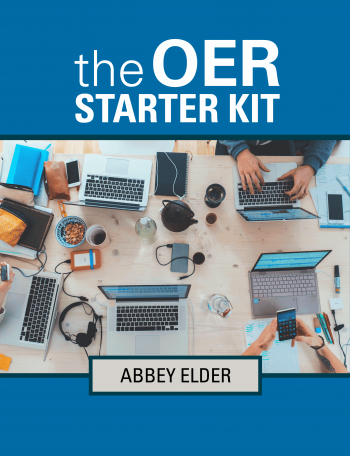

 The OER Starter Kit
by
The OER Starter Kit
by
This can mean:
If you're interested, contact the UCC Library for information about grants, existing OER for your subject, and tips for getting started.
When planning to use an open textbook or other OER in your course, it is important to plan and ask yourself the following questions:
After asking these questions, you can decide whether to adopt, adapt, or create a new OER for use in your course.
Various options are available to faculty interested in including OER in their courses. These options are listed below:
 Adopt
AdoptIf there are high quality, vetted Open Educational Resources available on the topic your course covers, and you do not feel the need to edit or otherwise alter them for use in your course, you might consider adopting them for use "as is." Adopting is the simplest way of including OER in your course and the least time-intensive.
 Adapt/Build
Adapt/BuildIf there are OER available on the topic your course covers, but they are dated, too broad, or contain information which is beyond the scope of your course, you may want to consider adapting the materials. After checking that the Creative Commons license attached to the materials allows for adaptation, you may choose to edit the materials to tailor them to your course.
Alternately, if there are OER available on the topic your course covers, but no single resource is broad enough to cover the needs of your course, you may want to consider building a "course pack," a selection of various OER, free online materials, and websites which make up the resources for use in a course. These packs can be extremely versatile and adaptable resources.
 Create
CreateIf there are no high-quality OER available on your topic or if you have course materials that you believe are superior to the OER available to you online, you may want to consider creating or licensing your course materials. Creating Open Educational Resources can be as simple as openly licensing and sharing a syllabus you currently use or sharing lesson plans on OER repositories like OER Commons.
Here are a few steps you might take in the evaluation process. If this process seems lengthy, think about the process you follow to review textbooks and other materials for your course. You can use a similar or modified evaluation process.
Examples of rubrics for evaluating OER are available below:
Here are a few toolkits to help aid you in the OER creation process.
Besides their general quality, the accessibility of OER is also an important factor to consider, especially in light of the online nature of most OER. Information about creating and evaluating the accessibility of OER is listed below. Contact the UCC Library and/or UCC Online for help with making sure that your course content is accessible.
The resources on this page provide additional information about Open Educational Resources: How To guides, workshops, and fact sheets are provided below.
Umpqua Community College Library, 1140 Umpqua College Rd., Roseburg, OR 97470, 541-440-4640
Except where otherwise noted, content in these research guides is licensed under a Creative Commons Attribution 4.0 International License.